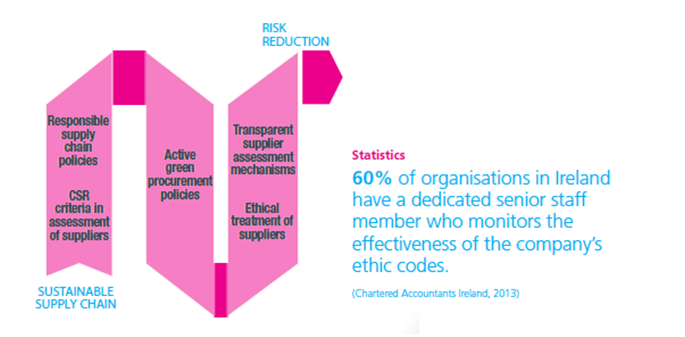Optimising Risk Reduction and Management with CSR
CSR policies and practices can help mitigate and manage risks in a number of areas – for example, supply chain risks such as human rights abuses, operational risks such as compliance with regulation and product risks such as waste created during production and health and safety. Focusing on sustainable supply chains, this has strong risk reduction opportunities. It can decrease reputation risks, provide goodwill capital and can lead to an increase in sales volumes.
In today’s fast paced economy all stakeholders, both internal and external, are demanding greater levels of transparency in terms of how a company operates and how the companies in their supply chain operate. It is no longer sufficient for a business to rely on CSR practices that they incorporate in their own business operations, now they must prove that all stages of their supply chain and the business relationships they have engaged in, are also developing socially and environmentally responsible practices.
Companies have a duty to ensure fair treatment in their supplier relationships. This level of transparency should also translate into a company’s relationship with its consumers, including treating them with integrity (BITCI, 2014).Corporate risk management must incorporate consumer reactions to the sustainability of supply chains.
The reactions of customers to unsustainable supply chains can affect trust in the brand and subsequent sales revenue (Sweetin et al, 2013 ). Multiple examples highlight the ‘knock-on’ effect of poor supply chain quality and consumer reaction e.g. Tyson Food, GAP and Nike.

By establishing and reporting on the effectiveness of a strategic sustainable procurement policy, companies are increasing their reputational capital and the firm’s overall reputation. Good audit procedures that highlight the effectiveness and benefits of CSR to all stakeholders now enable companies to take advantage of lower reputational risks, however only 35% of the world’s largest corporations publish reports on their environmental policies and performances (Greenbiz, 2013), indicating a current gap and lost advantage in CSR reporting.
This article is an extract from our publication, The Business Case for being a Responsible Business.
To receive a free copy, please contact Lorraine O’Toole lotoole@bitc.ie
Tags: csr


